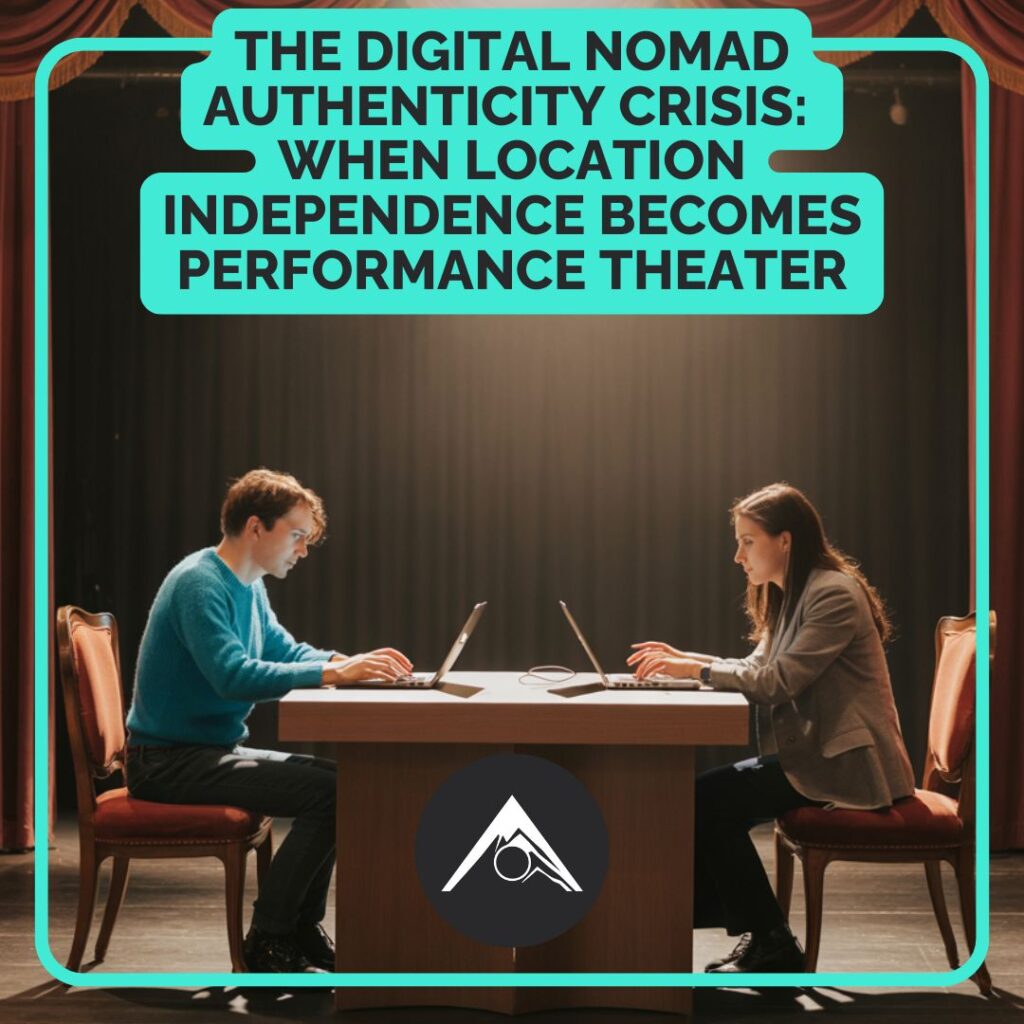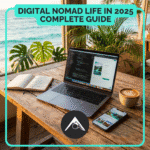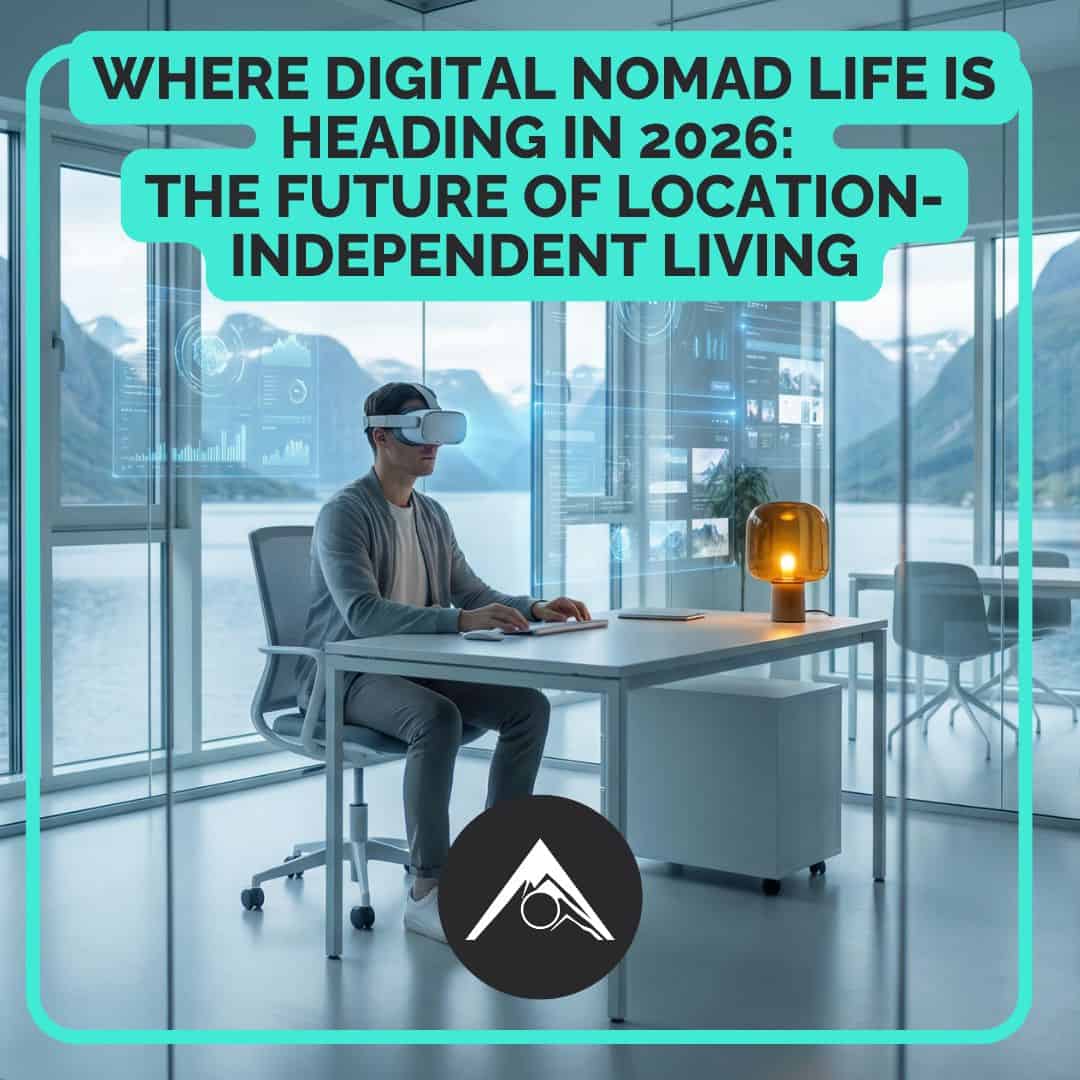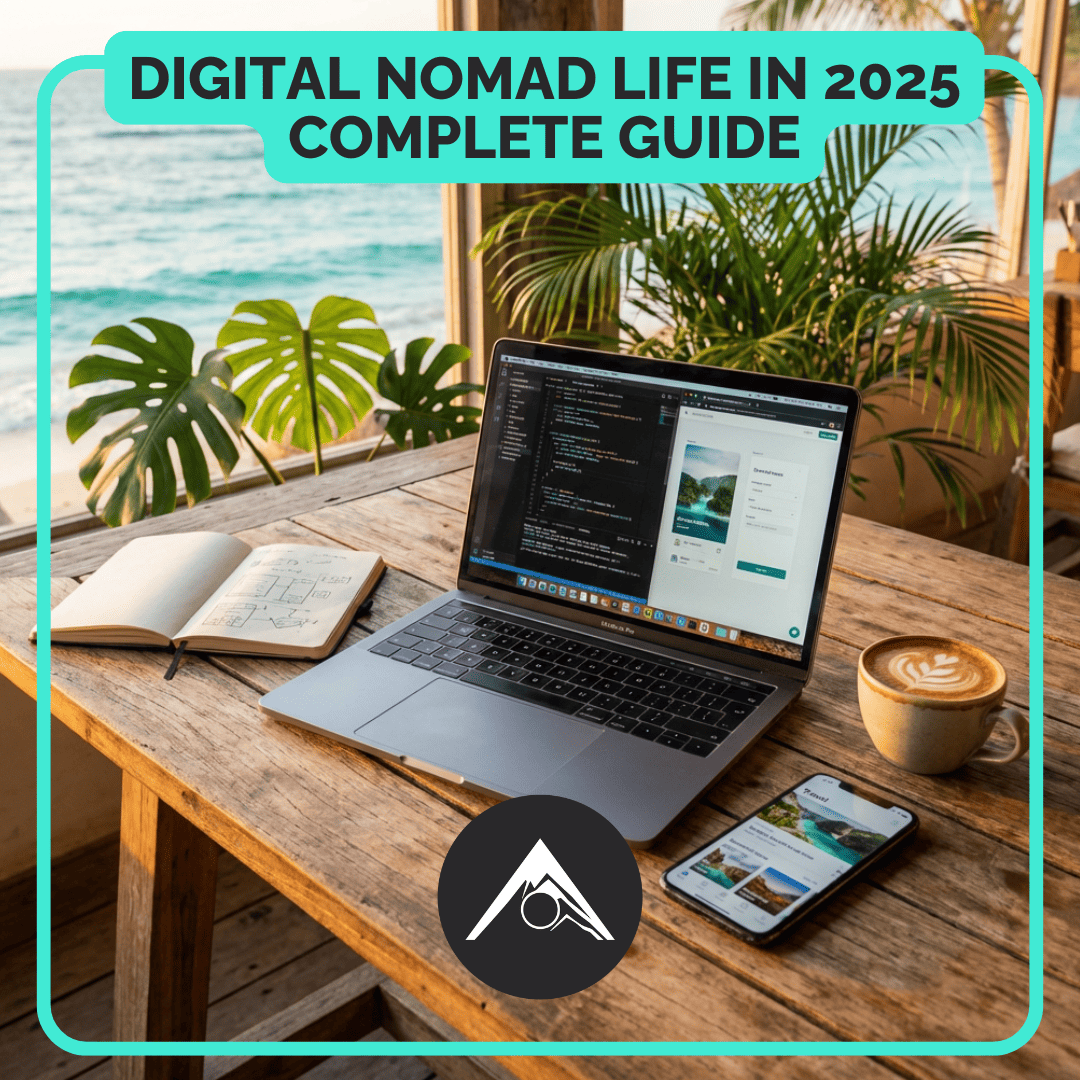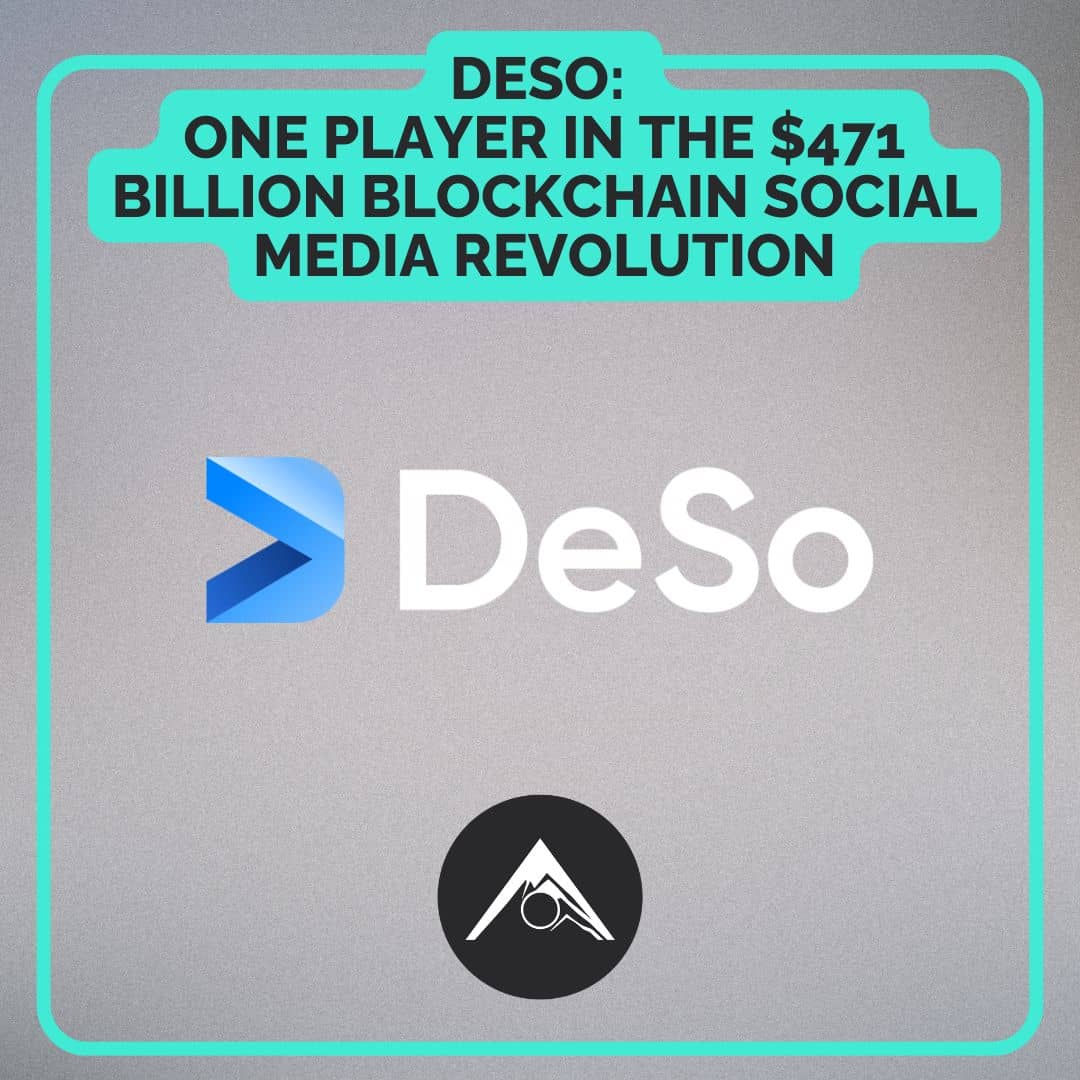The Digital Nomad Authenticity Crisis: When Location Independence Becomes Performance Theater
I stumbled across a Facebook post recently that struck a nerve, describing what the author called the “digital gonad” scene in Bali – a tongue-in-cheek reference to the performative, often superficial culture that has emerged in popular digital nomad destinations. While the post focused specifically on Bali, it highlighted a broader issue that’s becoming increasingly prevalent across digital nomad hotspots worldwide: the transformation of authentic location independence into elaborate performance theater.
As someone who’s spent years observing and participating in digital nomad communities, I felt compelled to explore this phenomenon beyond just one destination. The digital nomad authenticity crisis isn’t limited to Bali – it’s a global issue that affects remote workers, entrepreneurs, and location-independent professionals wherever they gather in significant numbers.
The Rise of Performative Digital Nomadism
Digital nomadism began as a genuine movement toward freedom – the ability to work from anywhere, experience diverse cultures, and build a lifestyle aligned with personal values rather than societal expectations. However, as the movement gained mainstream popularity, particularly accelerated by the pandemic, something fundamental shifted.
What started as authentic digital nomad experiences has increasingly become a carefully curated performance designed for social media consumption. The digital nomad authenticity crisis manifests when the pursuit of appearing successful, enlightened, or “living your best life” takes precedence over genuine personal growth and cultural exchange.
The Facebook post I read described encountering “crypto millionaires” and “productivity bros” alongside “spiritual healers” making substantial incomes from online services. While there’s nothing inherently wrong with financial success or spiritual pursuits, the issue arises when these identities become performative rather than authentic, creating an environment where every interaction feels transactional.
The Two Dominant Archetypes Driving the Crisis
The digital nomad authenticity crisis often revolves around two seemingly opposite but surprisingly similar archetypes that dominate many nomad communities:
The Hustle-Obsessed Entrepreneur
This archetype embodies the “grind culture” mentality, constantly discussing “funnel hacks,” scaling strategies, and the latest productivity systems. Every conversation becomes a subtle pitch, every relationship evaluated for its potential business value. These individuals often view their nomadic lifestyle as a backdrop for their entrepreneurial journey rather than a genuine cultural experience.
The Commodified Spiritual Seeker
On the surface, this archetype appears to be the antithesis of the hustle culture entrepreneur. They speak of abundance, consciousness, and healing. However, they’ve often commercialized spirituality to the same degree that the entrepreneurs have commercialized productivity. “Cacao ceremonies” become networking events, and “energy work” becomes another income stream.
The digital nomad authenticity crisis deepens when these two archetypes blend together, creating what the Facebook post aptly described as a “strange cocktail of materialism” wrapped in spiritual or entrepreneurial language.
The Performance Pressure of Digital Nomad Culture
One of the most insidious aspects of the digital nomad authenticity crisis is the pressure to perform even your personality. In many nomad communities, there’s an unspoken expectation that you should have your life figured out. You’re supposed to be “healed,” optimized, and constantly growing.
This performance pressure manifests in several ways:
Morning Routine Theater: Every digital nomad seems to have a perfectly curated morning routine involving meditation, journaling, cold showers, and superfood smoothies. While these practices can be genuinely beneficial, they often become performative displays rather than authentic self-care.
Trauma Processing Performance: The pressure to be “healed” and “whole” leaves little room for the messy, ongoing nature of genuine personal growth. Admitting to struggles, confusion, or simply not knowing what you’re doing with your life is met with suggestions to “raise your frequency” or attend another workshop.
Success Story Curation: The digital nomad authenticity crisis is fueled by the constant need to appear successful. Everyone is “crushing it,” launching something, or achieving another milestone. The reality of struggle, failure, or simply maintaining the status quo becomes invisible.
The Cultural Disconnection Problem
Perhaps the most troubling aspect of the digital nomad authenticity crisis is how it often involves a complete disconnection from local cultures and communities. The Facebook post highlighted this perfectly, describing foreigners living in bubbles, never learning local languages, and treating local culture as Instagram props.
This cultural disconnection isn’t unique to Bali – it’s a global phenomenon affecting digital nomad destinations worldwide. When nomads prioritize their online presence and networking with other nomads over genuine cultural engagement, they perpetuate a form of digital colonialism wrapped in the language of freedom and enlightenment.
The digital nomad authenticity crisis is compounded when nomads exhibit entitlement toward local communities, expecting special treatment or showing little respect for local customs and laws. This behavior undermines the original spirit of digital nomadism, which should involve cultural exchange and mutual respect.
The Social Media Amplification Effect
Social media plays a crucial role in perpetuating the digital nomad authenticity crisis. The pressure to document and share every aspect of the nomadic lifestyle creates a feedback loop where appearance becomes more important than reality.
Instagram feeds filled with laptop-on-beach photos, co-working space check-ins, and inspirational quotes about freedom create unrealistic expectations and pressure to perform. The digital nomad authenticity crisis is amplified when nomads spend more time crafting their online presence than engaging with their actual present-moment experience.
This social media performance affects not only how nomads present themselves but also how they choose destinations, activities, and even relationships. Decisions become filtered through the lens of “how will this look online?” rather than “what will genuinely enrich my experience?”
The Transactional Relationship Epidemic
One of the most damaging aspects of the digital nomad authenticity crisis is how it transforms relationships into transactions. The Facebook post mentioned how “friend” groups revolve around brand collaborations and launches, with relationships becoming instrumentalized rather than genuine.
This transactional approach extends beyond business networking into personal relationships. People are valued for their follower count, business success, or potential to provide opportunities rather than for their authentic selves. The digital nomad authenticity crisis deepens when community becomes impossible because every interaction is evaluated for its potential return on investment.
This phenomenon isn’t limited to romantic or friendship relationships – it extends to how nomads interact with local communities, service providers, and even fellow travelers. When everything becomes a potential content opportunity or networking possibility, authentic human connection becomes increasingly rare.
The Spiritual Materialism Trap
The intersection of spirituality and materialism represents one of the most complex aspects of the digital nomad authenticity crisis. Many nomads are genuinely seeking personal growth, healing, and expanded consciousness. However, the commercialization of these pursuits often leads to what Buddhist teacher Chögyam Trungpa called “spiritual materialism” – using spiritual practices to enhance ego rather than transcend it.
In digital nomad communities, spiritual materialism manifests as:
- Credential Collecting: Accumulating certifications in various healing modalities without deep practice or understanding
- Experience Shopping: Constantly seeking the next retreat, ceremony, or teacher without integrating previous experiences
- Spiritual Competition: Comparing levels of consciousness, healing progress, or spiritual achievements
- Commercialized Wisdom: Packaging spiritual insights into marketable products or services
The digital nomad authenticity crisis is particularly acute in this area because it combines the performance pressure of nomad culture with the ego-driven aspects of spiritual materialism.
Breaking Free from the Authenticity Crisis
Recognizing the digital nomad authenticity crisis is the first step toward addressing it. Here are some strategies for maintaining authenticity while embracing location independence:
Prioritize Internal Growth Over External Performance
True digital nomad experiences should prioritize internal development over external validation. This means:
- Engaging in practices for their intrinsic value rather than their performance potential
- Allowing for messiness, confusion, and not having everything figured out
- Measuring success by personal fulfillment rather than social media metrics
- Being honest about struggles and challenges rather than maintaining a perfect facade
Embrace Cultural Humility and Genuine Exchange
Combating the digital nomad authenticity crisis requires approaching new cultures with humility and genuine curiosity:
- Learning basic language skills in each destination
- Engaging with local communities beyond service interactions
- Understanding and respecting local customs and values
- Contributing positively to destinations rather than extracting value
- Recognizing the privilege inherent in location independence
Cultivate Non-Transactional Relationships
Building authentic community requires moving beyond transactional thinking:
- Developing friendships based on genuine compatibility rather than business potential
- Supporting others without expecting reciprocal benefits
- Engaging in activities that don’t produce content or networking opportunities
- Being present in conversations rather than constantly evaluating their utility
Practice Digital Minimalism
Reducing the influence of social media can help address the digital nomad authenticity crisis:
- Setting boundaries around content creation and sharing
- Engaging with destinations without documenting every moment
- Making decisions based on personal values rather than performance potential
- Cultivating appreciation for experiences that don’t translate well to social media
The Path Forward: Reclaiming Authentic Digital Nomadism
The digital nomad authenticity crisis doesn’t negate the genuine value of location independence. Instead, it highlights the need for more conscious, intentional approaches to nomadic living. The movement’s original promise – freedom, cultural exchange, and alignment between lifestyle and values – remains valid and important.
Addressing this crisis requires individual reflection and community-wide cultural shifts. We need to create spaces where vulnerability is welcomed, where success is defined broadly, and where the focus returns to the fundamental human experiences that make travel meaningful: connection, growth, and expanding our understanding of the world and ourselves.
The digital nomad authenticity crisis serves as a mirror, reflecting broader cultural issues around performance, materialism, and the commodification of experience. By acknowledging these challenges honestly, we can work toward creating nomad communities that embody the freedom and authenticity the movement originally promised.
As the nomad movement continues to evolve, the choice between performance and authenticity will define its future. The Facebook post that inspired this reflection serves as a wake-up call – a reminder that true freedom comes not from performing the nomadic lifestyle, but from living it with integrity, humility, and genuine openness to transformation.
The digital nomad authenticity crisis isn’t just about Bali, productivity bros, or spiritual materialism. It’s about the fundamental question of how we choose to live when freed from traditional constraints. The answer to that question will determine whether digital nomadism evolves into something genuinely transformative or remains trapped in the performance theater that currently defines much of the movement.
Source of article inspiration: https://killerstartups.com/gen-theres-a-toxic-side-to-balis-expat-community-no-influencer-shows-you-i-experienced-it/

